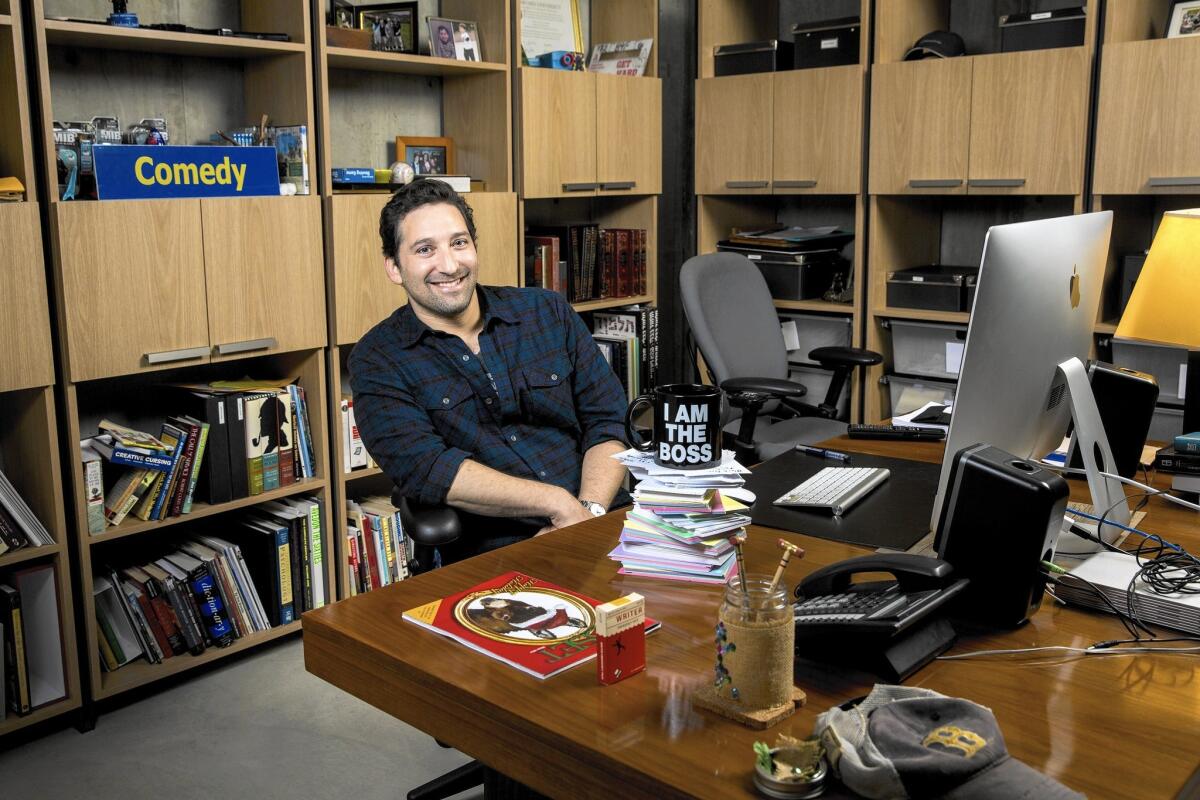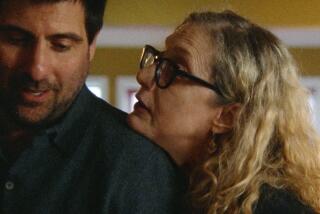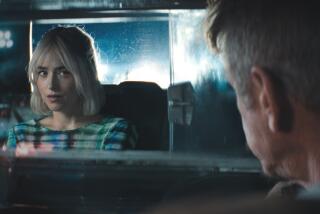Etan Cohen, director of ‘Get Hard,’ is used to confounding expectations

Imagination might carry us to new worlds, but the people doing the imagining are often exactly as you’d expect.
The executive with the greatest influence on family entertainment is Pixar chief John Lasseter — a jovial, Hawaiian-shirt-wearing father of five. The creator behind some of the most notable stoner man-child comedies of recent years is the stoner man-child comedian Seth Rogen.
Etan Cohen has been responsible for some of the more ribald work Hollywood has produced over the last couple of decades. The longtime screenwriter was a protégé of Mike Judge and worked on “Beavis & Butt-head”; he also penned the foul-mouthed antics of “Tropic Thunder.” And come Monday, Cohen will make his directorial debut when “Get Hard,” the prison-prep comedy starring Kevin Hart and Will Ferrell, premieres at the SXSW Film Festival ahead of its March 27 release.
Cohen’s movie features shots of frontal male nudity, Hart describing in Tennysonian detail the ways in which Ferrell’s prison-bound character will soon be sodomized, and material so raunchy that the film was initially given an NC-17 rating (Cohen and Warner Bros. then trimmed it to an R).
Yet Cohen is not at all as you’d expect. He’s a strictly observant Jew--a member of the Orthodox synagogue B’nai David who sends his three children to an Orthodox school, an alumnus of a prestigious Jewish day school in Boston and a post-high school yeshiva in Israel, and someone who still studies Torah every week with his rabbi from said yeshiva.
In a Hollywood proud of its rock-ribbed secularism, Cohen and his wife, Emily, abide by a deeply held set of tenets — obeying the biblical prohibition against work on Saturday and major holidays (most of “Get Hard” was shot on a Sunday-Thursday schedule), keeping strictly kosher and filtering all choices through the prism of the normative rules of halacha.
Hard-R comedy by day, Talmud study by night can create some uncomfortable internal divisions. It also makes Cohen something of a double outsider. He’s an anomaly in modern moviedom, which shies away from overt displays of religion (even the recent wave of evangelical movies tend to be made outside the studio mainstream). Cohen is also an outlier in the religious Jewish world, which--despite Hollywood’s high proportion of secular Jews--tends to view the place warily. There are, in fact, a handful of observant creatives in Hollywood, but they tend to be writers, a far more flexible job. And most aren’t making full-frontal comedies.
“People in our community ask me when the movie’s coming out, and I make it clear I never want anyone in our shul to see it,” Cohen said with a small laugh. “Someone was even saying ‘You should make an announcement and have a kiddush [post-services reception] and I said, ‘Uh, no.’”
Turning more serious, he said, “This has been a tension for me for many years. I always feel like I have a foot in two worlds.”
Cohen, 40, is at an upscale kosher restaurant in the Pico-Robertson neighborhood. He is wearing trendy jeans and the Silver Lake-ish newsboy cap he often prefers to a yarmulke. He has a low-key demeanor and brings up religion only when asked about it.
Yet devotion has been a central part of his life over his nearly 20-year career, one in which Cohen has sought to be the funniest guy in the room while knowing he’s also being seen as the most religious guy in the room.
It was there at the Harvard Lampoon. where he worked on as an undergraduate. It hovered in the writers’ room in his years on TV shows such as “American Dad” and “King of the Hill.” And it was present during this past year as the man captaining the set of a major Hollywood comedy.
“Get Hard,” which Cohen wrote with Jay Martel and Ian Roberts, is about the fragile and lily-white hedge-fund manager named James (Ferrell), who’s sentenced to a maximum-security prison for financial crimes he probably didn’t commit. It’s also about a car-wash operator named Darnell (Hart), who doesn’t have a thuggish bone in his body but is paid by a deluded James to help “get hard” in the 30 days before he’s sent to prison. Much of the movie concerns Darnell putting James through a series of absurdist training exercises.
The film’s comedy comes from the friction between the person we really are and the person others believe us to be. Early on, Darnell tells his wife, in essence, “I just have to think of the stereotypes he already thinks I am and just be those.” One needs neither a psychology degree nor an advanced knowledge of the Mishna to understand why Cohen would be attracted to this theme.
Trying to do both
I grew up in a Modern Orthodox home not dissimilar from Cohen’s. Like him, I attended a religious but academic-minded Jewish day school and joined my friends in a post-high-school gap year to study at a yeshiva in Israel (a school just down the road from Cohen’s, as it turns out).
Although he was raised in Boston and I in New York, through that unbreakable bond known as Jewish geography we have a number of people in common. Among his high school classmates I count several summer-camp friends, a good college friend and even an ex-girlfriend.
In my late teens and early 20s, I faced many of the same dilemmas as Cohen. Being a religious person in the modern world was hard enough (this was only the early days of the Internet, but still). It was especially hard if you wanted to pursue a creative career in something like journalism, which Modern Orthodoxy viewed with suspicion.
Though my career path was supported unequivocally by my parents, I could still feel the hot stare from the place I came from, the head shake of many people I grew up with. “You’re doing what? Journalism? But can you be religious?”
Some of this was practical. It’s difficult to stay observant in the hurlyburly of reporting; the news doesn’t know from sundown on Friday. And some of it, I think, was a more innate psychological resistance. A person who’s decided to live his life by a strict code of conformity has a harder time understanding a less traditional line of work.
In our conversation, Cohen raised a factor I’d never thought of— jobs like these pose an implicit challenge to a faith-based worldview. “I’ve always been interested in why religious people are suspicious of creative professions,” he said. “Does it just have something to do with creativity being about the individuals as opposed to being part of a community?”
Faced with skepticism from the only world I knew--and after considering the other myriad issues that decisions about faith and lifestyle often come with--I chose to turn away. And though I maintain a fondness for many of Orthodoxy’s cultural and intellectual aspects--and at times even wonder if I’m missing out on an appealing lifestyle--I’ve largely opted out of that world.
Meanwhile, several childhood friends who might have answered a call to venture outside their comfort zone went the other way. They essentially gave up the hope for a life of full-on exploration and instead put an emphasis on family and community, and the parameters that keep one there.
Cohen wasn’t born into an observant family. He turned to religion at 14, at the same time his parents did. Some who are raised Orthodox want to experience the liberation that comes from throwing off its chains. But Cohen had spent the early part of his childhood without that yoke, and as he matured, he appreciated the sense of comfort and meaning that can come with having it on.
So instead of either embracing or shunning the secular world, as so many others have, Cohen took a demographically less-traveled road—he decided to stay exactly where he was. He would abandon neither his religious nor his Hollywood aspirations, even if that meant each might suffer in the process. In doing so he implicitly made a case for what I and many others are skeptical is possible: that it’s viable, if hardly easy, to be both successful and observant in Hollywood.
Exploding stereotypes
Near the halfway mark of “Get Hard,” Hart’s Darnell is acting out for Ferrell’s James what the prison yard will be like. In a showcase of some impressive mimicry skills, he offers up in quick succession a white skinhead, a black heavy and a Latino gang member.
The scene dances on the edge of stereotype, but because it’s what Darnell imagines prison is like — after all, he’s never gotten near one — it somehow is OK. In fact, it turns into the kind of deceptively smart deconstruction of stereotype that’s become a Cohen specialty.
Arriving in Los Angeles from Harvard in the 1990s, Cohen began working on “Beavis,” in which he satirized the couch-potato of the American male in full crotch-scratching relief. Several years later, he sent up perceptions again, this time of Texas suburbia, when “Beavis” creator Mike Judge hired him to work on “King of the Hill.”
After writing, with Judge, the 2006 comedy “Idiocracy”--a kind of smart skewering of stupidity--Cohen offered perhaps the piece of stereotype-subversion he’s best known for: the 2008 comedy “Tropic Thunder.” In the film, characters like Ben Stiller’s mentally challenged Simple Jack and Robert Downey Jr.’s blackface Kirk Lazarus indulge in offensively broad caricatures to poke fun at the idea of the blowhard actor.
Cohen notched a few more family-friendly credits (“Madagascar: Escape 2 Africa” and “Men in Black 3”) but he would continue the edgy stereotype theme with “Get Hard,” a film in which Cohen is making a leap that few pull off--from writing straight to the director’s chair on an A-list comedy.
Asked what prompted him to hire Cohen, Warners head of production Greg Silverman said, “Etan comes from a writer’s place of comedy and has an understanding of how to craft a joke that a lot of directors don’t have.”
Judge believes some of Cohen’s comedy sensibility actually comes from his religious beliefs. “It reminds me a little of all the great Canadian comics I watched growing up who were outsiders. Etan is a little bit part of a different world, so he can look at things a little more objectively.”
Cohen is the furthest thing from a proselytizer or a flag-waver. But his steadfast interest in operating as an observant man in Hollywood, in asking two of the world’s most well-known comedians if they wouldn’t mind working Sundays so he can celebrate a holy day, quietly introduces to his work an element of seriousness and personal belief. He even hopes that a movie as raunchy and commercial as “Get Hard” conveys a deeper purpose. “It was really exciting to make a movie that has broad appeal but that may make some people have a conversation on the way home about race or inequality,” he said. “I do want to put a little medicine in with the sugar.”
And he can, occasionally, bring up religion in Hollywood circumstances, which can make for amusing juxtapositions. “I remember when Etan was out here in Austin with me working on ‘Idiocracy.’ He had just written this great line that said ‘… y’all, ya’lls,’” Judge said, leading the statement with an unprintable four-letter word. “And then about two minutes later he looks at his watch and says, ‘I have to go pray. Can you tell me which way is east?’”
When Cohen first arrived in Hollywood he wore a yarmulke all the time. It was fine in TV, he said, where the long-term conviviality of the writers’ room meant people soon came to forget about it. But it was a distraction in the feature world, where Cohen would spend half a pitch meeting answering questions about faith. So he decided, as he puts it, to “go incognito” and wear a hat.
Cohen believes he’s lost jobs because of his observance but dismisses the idea that this is discriminatory. “If you’re hiring someone to drive the bus,” he noted, citing his unwillingness to work certain days, “you want to make sure they have a driver’s license.”
His casual tone belies the pressure someone like him faces, from both sides — from the many secular Jews in the entertainment business, who may worry that they’re being judged, and from fellow observant Jews who think Hollywood represents an antithetical value system. It’s notable that among all the people I’ve talked to about Orthodoxy and the modern world, some of the least freighted comments came from someone who’s far from Judaism of any stripe.
“I saw Etan as a person whose priorities were intact,” Hart said when I asked what he made of Cohen’s observance. “Because the business should never put you in a place where what you believe is in jeopardy. And if you don’t set that precedent early,” he added, “you’ll never have that foundation.” (Warners’ Silverman says that Cohen’s observance was never an issue for the studio, noting only that “as a former craft-services guy I just wanted to make sure he could get good kosher food on set in New Orleans.”)
But actor and executive support is one thing; personal misgivings are another. “Get Hard” is a highly explicit comedy, and there are many scenes — a moment when Darnell goads James to perfect his fellatio skills on strangers comes to mind — that one might not want to bring up at Kol Nidre services.
Cohen, who would like to continue directing, says he has no easy answers on how to harmonize these competing aspects of his life. “I feel like if you’re a religious person you believe there’s a reason why you’re made to have certain talents,” he said. “Even though I haven’t totally resolved this struggle, I feel like there’s a reason I’m grappling with it.”
He did once ask a rabbi he trusted about his conundrum. “He told me that truth is godly in some way, and if you feel this is a true expression of yourself, follow that.”
He paused and added wryly. “Of course, I don’t know if he knew that where that would lead me was to a bathroom [fellatio] scene.”
Such wheels are often turning for Cohen, who indeed might be a worthy template as a religious filmmaker not because he has all the answers but because he hasn’t found many at all — because, when it comes to matters of faith, he’s muddling along like the rest of us, sure of where he’s going only part of the time.
“I feel like one of the great benefits of living a religious life is that it constantly challenges you to see where your values are, makes you ask where you were and where you’d like to go.” He paused. “A lot of this has been a tough experience. But it’s also been a galvanizing experience.”
More to Read
Only good movies
Get the Indie Focus newsletter, Mark Olsen's weekly guide to the world of cinema.
You may occasionally receive promotional content from the Los Angeles Times.










